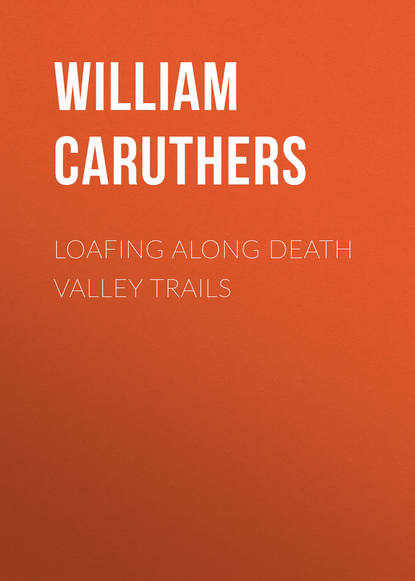По всем вопросам обращайтесь на: info@litportal.ru
(©) 2003-2024.
✖
Loafing Along Death Valley Trails
Настройки чтения
Размер шрифта
Высота строк
Поля
“There was no way out and besides, I figured what he didn’t know wouldn’t hurt him. He told her what a wonderful voice she had, how the song had touched him and hoped she would sing at one of his meetings.
“Blonde Betty was pretty as curly ribbon and I was afraid every minute he was going to ask if he could call on her, so I horned in and said, ‘Parson, excuse me, but I promised I would bring Miss Betty home right away.’
“So I took her arm and pulled her away.
“‘You big-mouthed bum,’ Betty says when we were out of hearing. ‘Why don’t you attend to your own business? I know how to act.’”
Shorty pointed to a riot of wild flowers on the side of a hill across the gulch. “The next day I saw her and the Parson picking flowers right over there. Of course he didn’t know then what she was. After that I reckon he didn’t give a dam’. He chucked the preaching job and ran off with Betty. But maybe God went along. They got married and live over in Nevada and you couldn’t find a happier family or a finer brood of children anywhere.
“It is no argument for sin, but this was a hell of a country in those days and you just couldn’t always live by the Book.”
On July 4, 1905 Shorty Harris made the strike which started the town of Harrisburg, now only a name on a signboard. A feud due to a partnership of curious origin, started immediately and is worth mention only because it confused historians of a later period who, gathering material after Shorty’s death have given only the story of the feudist who survived him.
Here is Shorty’s version: “I was trying to save distance by taking the Blackwater trail across Death Valley into the Panamint. I had been over the country and had seen a formation that looked good and was going back to look it over. The Blackwater trail is a wet trail and one of my burros sank in the ooze. I had just gotten her out when a fellow I’d never seen before, came up. He said he was a stranger in the country and he wanted to get to Emigrant Springs where his two partners were waiting. He explained that the foreman at Furnace Creek had told him I had left only a short while before, but he might overtake me by hurrying, and I would show him the way. Then he asked if he could join me.
“I told him it was free country and nobody on the square was barred. When I reached my destination I showed him the trail to Emigrant Springs. I reckon I talked too much on the way over – maybe made him think I had a gold mountain. Anyway, he said he believed he would look around a little to see what he could find. I didn’t even know his name and though it was against the unwritten code, he followed me. There wasn’t anything I could do about it without trouble and I was looking for gold – not trouble.
“In 15 minutes I had found gold. He was pecking around a short distance away and also found rock with color and claimed a half interest. It was then that I learned his name – Pete Auguerreberry and that his partners were Flynn and Cavanaugh. Wild Bill Corcoran had grubstaked me. I told Pete five partners were too many and we should agree upon a division point – each taking a full claim and he could have his choice.
“He refused and wanted half interest in both and nothing short of murder would have budged him. I went to Rhyolite for Bill Corcoran. He went for his partners. When we met, Corcoran had an offer to buy, sight unseen, from one of Schwab’s agents. Everyone of us wanted to sell, except Pete who stood out for a fantastic price. His partners offered to give him a part of their share if he would accept the offer. Pete refused. He thought it was worth millions. Wild Bill organized a company and we started work.”
For awhile it seemed the Harrisburg claims would prove to be good producers. In the end it was just another town on the map for Shorty. Futile years for Pete.
Once I asked Shorty Harris how he obtained his grubstakes. “Grubstakes,” he answered, “like gold, are where you find them. Once I was broke in Pioche, Nev., and couldn’t find a grubstake anywhere. Somebody told me that a woman on a ranch a few miles out wanted a man for a few days’ work. I hoofed it out under a broiling sun, but when I got there, the lady said she had no job. I reckon she saw my disappointment and when her cat came up and began to mew, she told me the cat had an even dozen kittens and she would give me a dollar if I would take ’em down the road and kill ’em.
“‘It’s a deal,’ I said. She got ’em in a sack and I started back to town. I intended to lug ’em a few miles away and turn ’em loose, because I haven’t got the heart to kill anything.
“A dozen kittens makes quite a load and I had to sit down pretty often to rest. A fellow in a two-horse wagon came along and offered me a ride. I picked up the sack and climbed in.
“‘Cats, eh?’ the fellow said. ‘They ought to bring a good price. I was in Colorado once. Rats and mice were taking the town. I had a cat. She would have a litter every three months. I had no trouble selling them cats for ten dollars apiece. Beat a gold mine.’
“There were plenty rats in Pioche and that sack of kittens went like hotcakes. One fellow didn’t have any money and offered me a goat. I knew a fellow who wanted a goat. He lived on the same lot as I did. Name was Pete Swain.
“Pete was all lit up when I offered him the goat for fifty dollars. He peeled the money off his roll and took the goat into his shack. A few days later Pete came to his door and called me over and shoved a fifty dollar note into my hands. ‘I just wanted you to see what that goat’s doing,’ he said.
“I looked inside. The goat was pulling the cork out of a bottle of liquor with his teeth.
“‘That goat’s drunk as a boiled owl,’ Pete said. ‘If I ever needed any proof that there’s something in this idea of the transmigration of souls, that goat gives it. He’s Jimmy, my old sidekick, who, I figgered was dead and buried.’
“‘Now listen,’ I said. ‘Do you mean to tell me you actually believe that goat is your old pal, whom you drank with and played with and saw buried with your own eyes, right up there on the hill?’
“‘Exactly,’ Pete shouted, and he peeled off another fifty and gave it to me. So, you see, a grubstake, like gold, is where you find it.”
Chapter X
Greenwater – Last of the Boom Towns
Located on Black Mountain in the Funeral Range on the east side of Death Valley, Greenwater was the last boom town founded in the mad decade which followed Jim Butler’s strike at Tonopah. Records show locations of mining claims in the district as early as 1884, but all were abandoned.
The location notice of a “gold and silver claim” was filed in 1884 by Doc Trotter, a famous character of the desert, remembered both for his good fellowship and his burro – Honest John – a habitual thief of incredible cunning, “Picked locks with baling wire…”
The first location of a copper claim was made by Frank McAllister who, with a man named Cooper and Arthur Kunzie, may be credited with one of the West’s most spectacular mining booms.
In 1905 Phil Creaser and Fred Birney took samples of the Copper Blue Ledge and sent them to Patsy Clark, who was so impressed that he dispatched Joseph P. Harvey, a prominent mining engineer to look at the property. Harvey started from Daggett and had reached Cave Spring in the Avawatz Mountains when he was caught in a cloudburst and lost all his equipment. He returned to Daggett, secured a new outfit and this time reached Black Mountain, but was unable to locate the claims.
Again Birney and Creaser contacted Clark and this time the mining magnate came to Rhyolite, ordered another examination of the property, giving his agent authority to buy. Upon the assay’s showing, the claims were bought. Immediately Charles M. Schwab, August Heinze, Tasker L. Oddie, Borax Smith, W. A. Clark, and many other moguls of mining hurried to the scene or sent their agents. In their wake came gamblers, merchants, crib girls, soldiers of fortune, and thugs.
$4,125,000 was paid for 2500 claims. Result – a hectic town with as many as 100 people a day pouring out of the canyons onto the barren, windy slope.
Noted mining engineers announced that Black Mountain was one huge deposit of copper with a thin overlay of rock, dirt, and gravel. “It will make Butte’s ‘Richest Hill on Earth’ look like beggars’ pickings,” they announced.
Greenwater stocks sky-rocketed and so many people poured into the new camp that the town was moved two miles from the mines in order to take care of the growth which it was believed would soon make it a metropolis. Before pick and shovel had made more than a dent on the crust of Black Mountain, two newspapers, a bank, express lines, and a magazine were in operation.
Here Shorty Harris missed another fortune only because his partner went on a drunk.
Leaving Rhyolite, Shorty had induced Judge Decker, a convivial resident of Ballarat to furnish a grubstake to look over Black Mountain. He made several locations, erected his monuments, returned to Ballarat and gave them to Decker to be recorded.
When the papers reached Ballarat with the news that the copper barons were bidding recklessly for Greenwater claims Shorty was broke again. Bursting into Chris Wicht’s saloon, he shouted, “Where’s the Judge?”
Chris nodded toward the end of the bar where the Judge, swaying slightly, was waving his glass in lieu of a baton while leading the quartet in “Sweet Adeline.” Wedging through the crowd, Shorty touched the Judge’s elbow: “Lay off that cooking likker, Judge. It’s Mum’s Extra for us from now on.”
“Yeh? How come?” the Judge asked thickly.
“We’re worth a billion dollars,” Shorty said. “I staked out that whole dam’ mountain. Where’re those location notices?”
“What location notices?” Decker blinked.
“The ones I gave you to take to Independence.”
With one hand the Judge steadied himself on the bar. With the other he fumbled through his pockets, finally producing a frayed batch of papers, covered with barroom doodling, but no recorder’s receipt for the location notices. “Well, I’ll be damned,” he muttered.
“So’ll I,” Shorty gulped.
If Decker had recorded the notices both he and Shorty would have become rich through the sale of those claims.
When laborers cleared the ground to begin work for Schwab, Patsy Clark, and others, they tore down the monuments containing the unrecorded notices.
In a little cemetery on the gravel flats at Ballarat, lies Decker.
Pleasantly refreshed with liquor one yawny afternoon he managed to have the last word in an argument with the constable, Henry Pietsch and went happily to his room. Later the constable thought of a way to win the argument and went to the Judge’s cabin. A shot was heard and Pietsch came through the door with a smoking gun in his hand. Decker, he said, had started for a pistol in his dresser drawer. But Decker was found with a hole in his back, his spine severed. At Independence, the constable was acquitted for lack of evidence and returned to Ballarat to resume his duties, but was told that he might live longer somewhere else. Pietsch didn’t argue this time and thus avoided a lynching. He left Ballarat and, I believe, was hanged for another murder.
Among those who came early to Greenwater, none was more outstanding than a gorgeous creature with a wasp waist who stepped from the stage one day, patted her pompadour with jewelled fingers, gave the bustling town an approving glance. Then she turned to the bevy of blondes and brunettes she had brought. “It’s a man’s town, girls…”
Bystanders were already eyeing the girls; their scarlet lips and the deep dark danger in their roving eyes.
So Diamond Tooth Lil was welcomed to Greenwater and became important both in its business and social economy.
It was agreed that Lil was a good fellow. Greenwater also learned that her word was good as her bond. She kept an orderly five dollar house and if anyone chose to break her rules of conduct, he ran afoul of her six-gun. Because she could fight like a jungle beast, she was also called Tiger Lil. Somewhere along the line, four of her upper teeth had been broken and in each of the replacements was set a diamond of first quality. As Greenwater prospered so did Diamond Tooth Lil.







